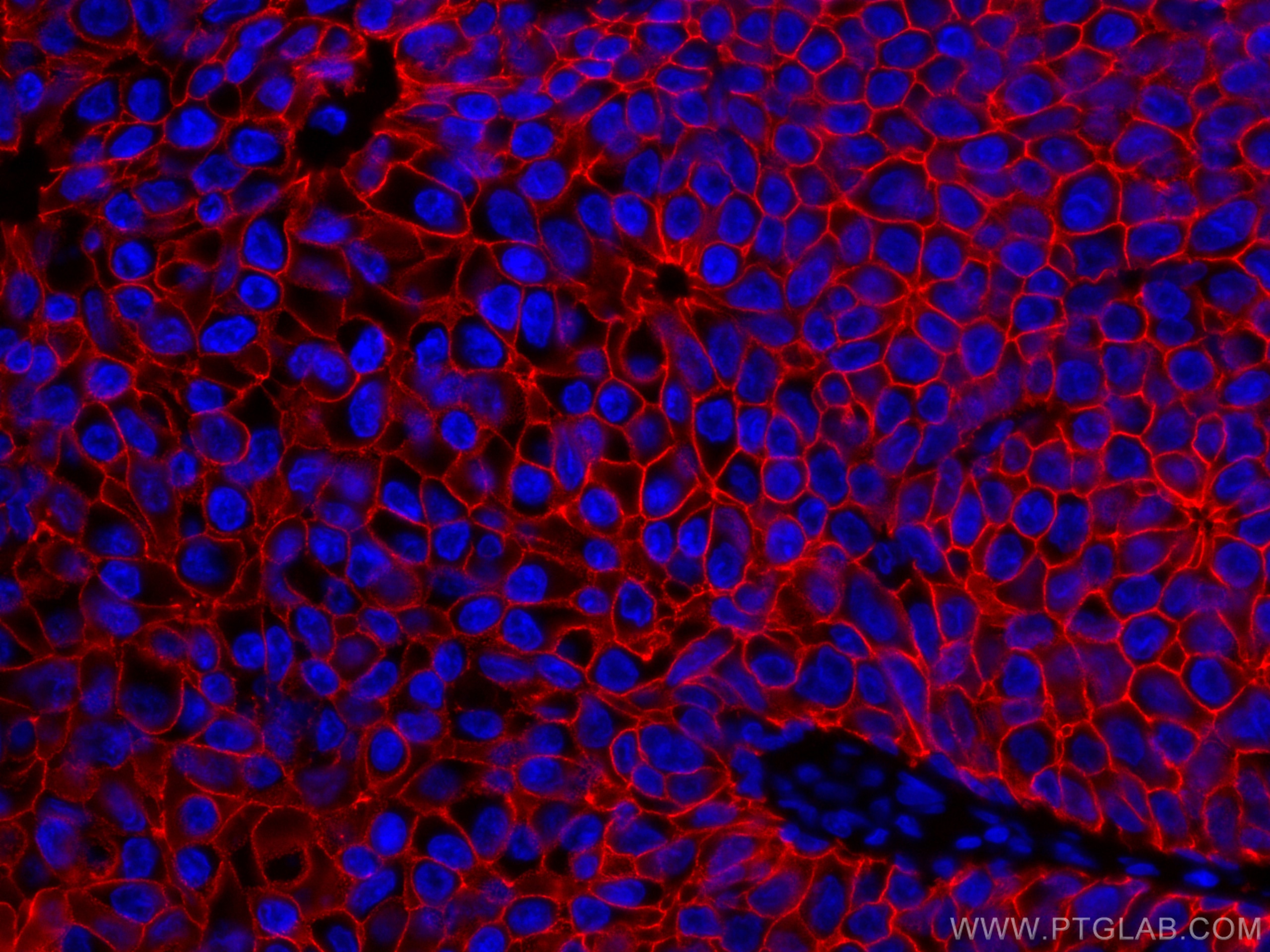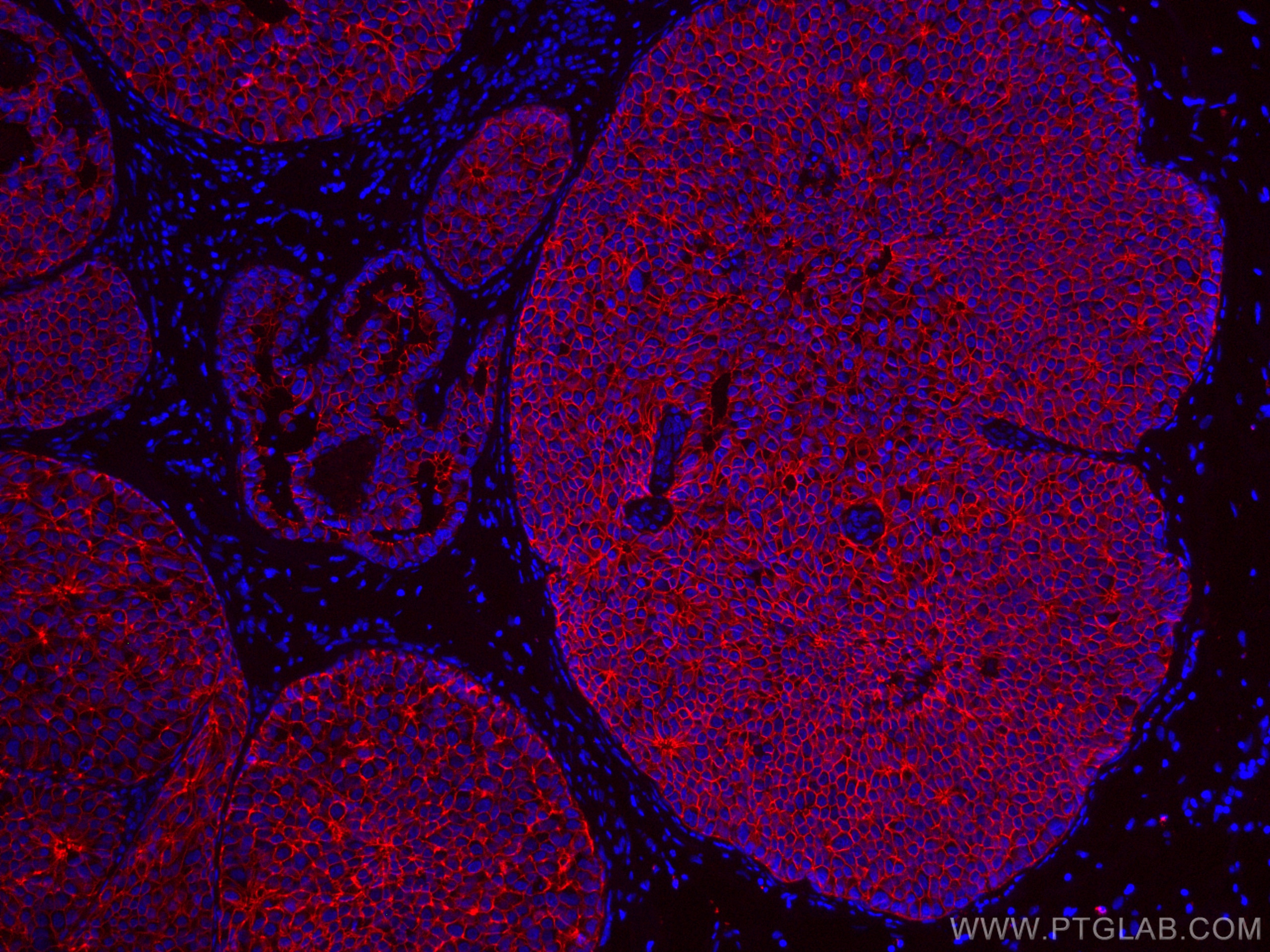- Phare
- Validé par KD/KO
Anticorps Monoclonal anti-E-cadherin
E-cadherin Monoclonal Antibody for IF
Hôte / Isotype
Mouse / IgG2b
Réactivité testée
Humain, porc
Applications
IF
Conjugaison
CoraLite®594 Fluorescent Dye
CloneNo.
6B11F11
N° de cat : CL594-60335
Synonymes
Galerie de données de validation
Applications testées
| Résultats positifs en IF | tissu de cancer du sein humain, |
Dilution recommandée
| Application | Dilution |
|---|---|
| Immunofluorescence (IF) | IF : 1:50-1:500 |
| It is recommended that this reagent should be titrated in each testing system to obtain optimal results. | |
| Sample-dependent, check data in validation data gallery | |
Informations sur le produit
CL594-60335 cible E-cadherin dans les applications de IF et montre une réactivité avec des échantillons Humain, porc
| Réactivité | Humain, porc |
| Hôte / Isotype | Mouse / IgG2b |
| Clonalité | Monoclonal |
| Type | Anticorps |
| Immunogène | E-cadherin Protéine recombinante Ag15085 |
| Nom complet | cadherin 1, type 1, E-cadherin (epithelial) |
| Masse moléculaire calculée | 882 aa, 97 kDa |
| Poids moléculaire observé | 120 kDa |
| Numéro d’acquisition GenBank | BC141838 |
| Symbole du gène | CDH1 |
| Identification du gène (NCBI) | 999 |
| Conjugaison | CoraLite®594 Fluorescent Dye |
| Excitation/Emission maxima wavelengths | 588 nm / 604 nm |
| Forme | Liquide |
| Méthode de purification | Purification par protéine A |
| Tampon de stockage | PBS avec glycérol à 50 %, Proclin300 à 0,05 % et BSA à 0,5 %, pH 7,3. |
| Conditions de stockage | Stocker à -20 °C. Éviter toute exposition à la lumière. Stable pendant un an après l'expédition. L'aliquotage n'est pas nécessaire pour le stockage à -20oC Les 20ul contiennent 0,1% de BSA. |
Informations générales
Cadherins are a family of transmembrane glycoproteins that mediate calcium-dependent cell-cell adhesion and play an important role in the maintenance of normal tissue architecture. E-cadherin (epithelial cadherin), also known as CDH1 (cadherin 1) or CAM 120/80, is a classical member of the cadherin superfamily which also include N-, P-, R-, and B-cadherins. It has been regarded as a marker for spermatogonial stem cells in mice(PMID:23509752). E-cadherin is expressed on the cell surface in most epithelial tissues. The extracellular region of E-cadherin establishes calcium-dependent homophilic trans binding, providing specific interaction with adjacent cells, while the cytoplasmic domain is connected to the actin cytoskeleton through the interaction with p120-, α-, β-, and γ-catenin (plakoglobin). E-cadherin is important in the maintenance of the epithelial integrity, and is involved in mechanisms regulating proliferation, differentiation, and survival of epithelial cell. E-cadherin may also play a role in tumorigenesis. It is considered to be an invasion suppressor protein and its loss is an indicator of high tumor aggressiveness.
Protocole
| Product Specific Protocols | |
|---|---|
| IF protocol for CL594 E-cadherin antibody CL594-60335 | Download protocol |
| Standard Protocols | |
|---|---|
| Click here to view our Standard Protocols |



